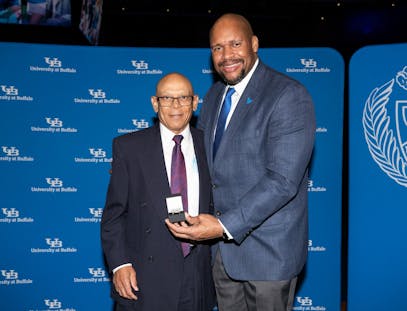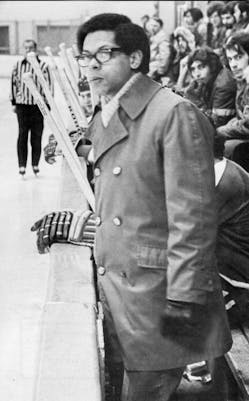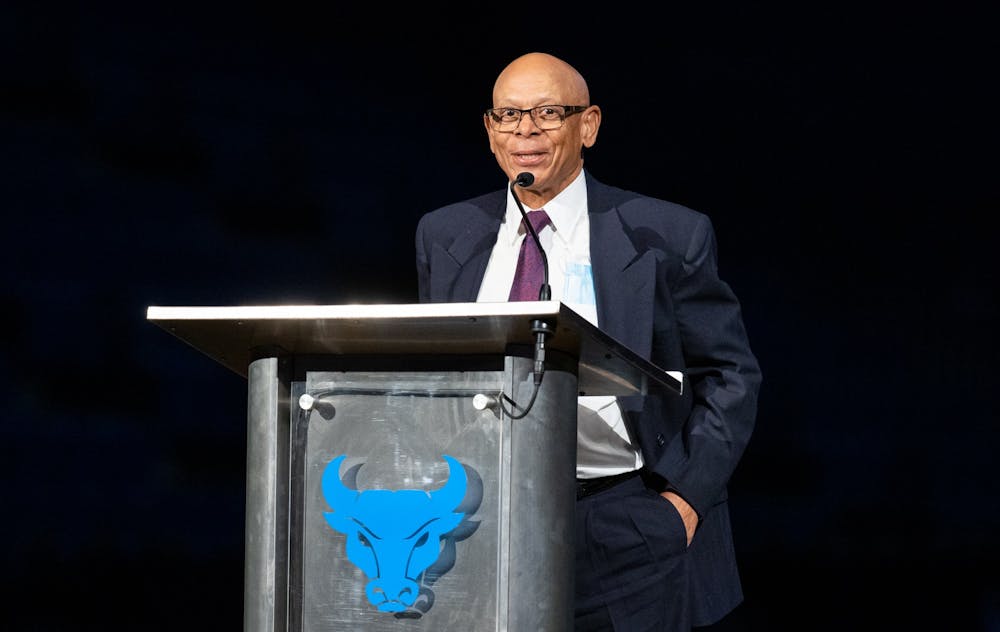UB was a far different place in the ‘70s than it is today.
Racial tensions, violence and protests had spiraled as the UB men’s basketball team boycotted practice over alleged racial ignorance by its head coach.
The campus was a product of the time period it was in, and just three years after Dr. Martin Luther King Jr. was assassinated, the nation was in social disarray.
This is the environment Ed Wright — a Black 1969 Boston University hockey standout — walked into when he was hired by UB to be its head hockey coach in 1970.
“It was definitely a turbulent time,” Wright told The Spectrum. “I definitely felt the racial intimidation both on and off the ice. But that was what I had to deal with. The school had an opening for a hockey coach and they decided to give it to a Black man, so I took it.”
In doing so, Wright became the first Black hockey coach in NCAA history. He joined a hockey program in just its second season as a varsity sport and went on to lead the Bulls for 12 seasons, amassing a 138-155-7 record. Wright oversaw a program in its formative years and turned it into a formidable contender.
But it wasn’t easy for Wright, who was subjected to racial and homophobic slurs at both home and away games. Hockey was undoubtedly a “white man’s game” in the ‘70s, and both fans and officials harassed Wright and his players at every opportunity.
“The officials had a lot to do with it because they were not about to let a Black man be successful and they took it out on my players,” Wright said. “That’s one of the reasons why I love the players that I had. They learned some lessons about life because they were being pre-judged based on who I am. And I loved them for the fact that they were not going to put up with it.”
Wright recalls times when certain restaurants wouldn’t serve him and when opposing fans had to be roped off from his bench to prevent violence.
But having played hockey from a young age, Wright was used to verbal abuse. Wright shared the ice with Japanese linemates — future Olympians Mel and Herb Wakabayashi — while playing for the Chatham Jr. Maroons in Chatham, Ontario. He says the group “heard it all” from fans in the stands and opponents on the ice. Even parents would chime in.
“I had lessons from the get-go,” Wright said. “We dealt with racial slurs all the time. Unfortunately, it became a regular part of life for a lot of us. But we learned a lot about others and a lot about ourselves from those life experiences. It wasn’t easy, but I learned how to get through a lot. I got stronger from it.”
‘Tough love’
These experiences fueled Wright to become a tough, nard-nosed coach at UB. Despite standing at just 5-foot-3 and weighing 140 lbs., Wright earned a strong reputation and demanded his players’ respect by “kicking them in the ass.”
Wright had high expectations for the program he built from the ground up. That’s why he scheduled games against powerhouses such as Colgate and Ohio State despite being a Division II program.
Wright had the ability to balance a “boot in their rear end” coaching style with a holistic approach, which allowed his players to see past the color of his skin and small stature.

UB Athletic Director Mark Alnutt (right) and former hockey head coach Ed Wright (left) stand onstage during the 2022 UB Athletics Hall of Fame induction ceremony.
“It’s got nothing to do with ‘I don’t like you or I dislike you,’” Wright said. “It’s the fact that I’m paying attention and I want you to be better than who you are.”
Seth Van Voorhis, an assistant coach on UB’s ACHA D-I club hockey team, met Wright a couple of weeks ago when the Chatham native was inducted into the UB Athletics Hall of Fame. Van Voorhis, also an undersized Black hockey coach, says Wright’s personality bleeds through his small frame.
“He’s a very powerful person,” Van Voorhis said. “You can just see that in the way he carries himself. I think we’re about the same height, we’re [both] about 5-foot-3. But you wouldn’t be able to tell that because of the way he carries himself and how confident he is in everything that he does.
“The biggest thing he told me when I met him, he said, ‘Use love and tough love.’ You care for your players, you love your players, but then when it’s game time is when tough love kicks in and you’ve got to kick your guys in the rear.”
Wright stepped down from his head coaching position to earn his doctoral degree in 1981, but he reluctantly agreed to coach the team for a final year during the 1986-87 season.
Exhausted after years of fighting abuse and lackluster on-ice results, Wright called it a career after 12 seasons at the helm of the team. But this didn’t mean Wright’s career at UB was over.
A self-described “burnt-out, raving maniac,” by the end of his head coaching career, Wright remained with the school to help develop its recreation and intramural sports program.
The intramural program took off and Wright’s journey through UB culminated with a $220,000 donation by Tunney Murchie — a former player under Wright — to build the Edward L. Wright Practice Facility in Alumni Arena.
Commonly known as the “triple gym,” the facility features three basketball courts and is the site of UB’s intramural basketball and volleyball games.
“The number of students that I touched with the program, I just laugh. It makes me feel so good,” Wright said. “It was all based on the fact that as an academic student, you’re there at the university. How can I get out one hour a week with my buddies, have a beer after playing a game of basketball, a game of tag football, and at the same time pretend I’m on a real sports team?”
Morgan Von Hedemann, the club team’s current head coach, says Wright has had an outsized influence on the university’s athletics program. “His legacy is outstanding,” Von Hedemann said, noting that he wishes Wright received more credit from UB.
‘Every day there are new lessons to be learned’
In the spring of 1987, UB discontinued hockey as a varsity sport and relegated it to the club level.
Disappointed in the decision to cut the hockey program, Wright decided to support the general student body through his involvement in intramural sports and recreation.
But 35 years later, he says he still isn’t pleased with the school’s decision.
Wright calls hockey “undoubtedly the most sophisticated sport that’s being played today.”
“It’s faster than fast and it’s all about life,” Wright said. “Because you’re thinking on your feet, things are happening at such an enormous speed. Decisions have to be made spontaneously. You don’t have time to sit down and write up a play or do this or do that. That’s the intriguing aspect of the game which is in accordance with what is going on in life. That’s the beauty of the sport. And that’s the reason why UB should be playing [NCAA] ice hockey.”
Wright, 77, now lives in Arizona — a far trek from the Queen City. He is a member of the Chatham Sports Hall of Fame and the UB Athletics Hall of Fame. He had a standout playing career at Boston University and will forever retain the distinguished honor of being the first Black head hockey coach in NCAA history.

Wright became a trailblazer and a pioneer during a time when hockey had outward racial stereotypes. But it’s not an achievement he brags about.
As somebody who wants to see the game become more equal, Wright calls being solely recognized as the first Black NCAA hockey coach “disconcerting.”
“Don’t let the color of my skin overshadow the content of who I am. Don’t let that overshadow my ability and my qualities,” Wright said.
As a retired hockey coach, administrator and teacher, Wright still looks back on his days in Buffalo fondly. He says he misses the time he spent actively working with students and shaping the country’s youth.
While he was a no-nonsense leader of men on the ice, he was also a loving teacher. As a man who experienced great trials and tribulations not just through the game of hockey, but throughout life, Wright says he feels he has a unique perspective to offer students.
But still, even at age 77, Wright is eager to grow and learn.
“I miss it [being at UB],” Wright said. “People say, ‘Hey you’re retired,’ and I say, ‘This s—t ain’t easy.’ The beauty of being at UB was that every semester was a whole new group of students and new minds to work with. Now for me, it’s all about looking in the mirror and learning as much as I can while I’m still here. Every day there are new lessons to be learned.”
Anthony DeCicco is the senior sports editor and can be reached at anthony.decicco@ubspectrum.com and @DeCicco42 on Twitter

Anthony DeCicco is the Editor-in-Chief of The Spectrum. His words have appeared in outlets such as SLAM Magazine andSyracuse.com. In 2020, he was awarded First Prize for Sports Column Writing at the Society of Professional Journalists' Region 1 Mark of Excellence Awards. In his free time, he can be found watching ‘90s Knicks games and reading NFL Mock Drafts at 3 a.m.





